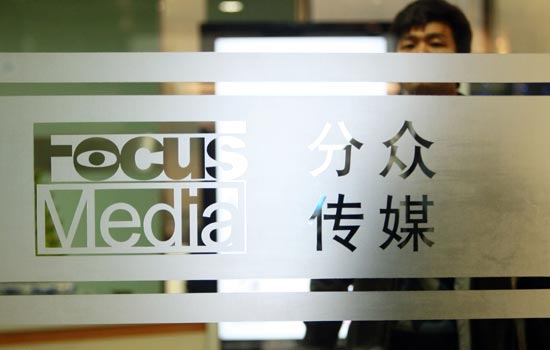
The Chinese digital media business, Focus Media Holding Ltd, is planning to de-list itself from Nasdaq in the largest ever such move.
The decision follows on a series of attempted management buyouts of Chinese companies in recent months, many of which had seen their accounting practices questioned and their valuations take a hit as a result.
|
 |
|
A Focus Media Holding Ltd office in Shanghai. The Chinese digital-media business is planning to de-list itself from Nasdaq. [Photo/China Daily] |
China's top private equity funds, including FountainVest Partners Co Ltd and China Everbright Ltd, and the US buyout fund Carlyle Group LP, are offering $3.5 billion to take Focus Media Holding Ltd private and are working toward that goal with Jiang Nanchun, Focus Media chief executive officer, according to a company statement published on Monday night.
The group of investors are in favor of offering shareholders in the company $27 for each of their American depositary receipts or $4.50 in cash for each of their ordinary shares. The company's board of directors has formed a committee to evaluate the proposed transaction.
The buyout bid pushed the company's shares up by 8.85 percent on Monday to close at $25.45, slightly below the offer price.
Following the company's announcement, the financial services group CLSA Asia-Pacific Markets maintained its "buy" rating on Focus Media's shares and estimated that the buyout process will last at least four months.
The brokerage said it believes the offer "is a strong approval of the company's assets" and forecast its shares will rise significantly during the buyout talks.
Operating advertising screens in offices, elevators and supermarkets across China, Focus Media reported a net profit of $37.9 million in the first quarter of 2012, up 85 percent year-on-year.
But its shares were hit hard last year by the research firm Muddy Waters LLC, which accused the company of overstating the number of TV screens it has in its advertising network and overpaying for acquisitions to mask its losses. A report it issued helped depress the value of the company's shares by close to 40 percent in November.
"The problems we have uncovered are likely the tip of the iceberg," said Carson Block, founder of Muddy Waters.
Yet, Shao Jiong, an analyst with Macquarie Securities Group, kept a rating of "outperform" for the company's stock, saying that "it runs a great business, generates tons of cash, pays dividends and buys back its shares".
Morgan Stanley also predicted the company's annual rate of profit growth will remain at 30 percent in the coming years. And the decline in its shares' value is expected to provide opportunities to institutional investors seeking to acquire companies.
Chinese stocks listed on foreign exchanges are "far too devalued" as a result of the controversies surrounding the companies, said Wang Yaoji, deputy director of Fudan University's Securities Research Institute.
According to data compiled by Bloomberg, the shares of the 180 Chinese companies listed on foreign exchanges since the start of 2010 are trading at 21 percent below their offer price on average.
"Exceptional cases of accounting fraud should not distract attention from the fact that the majority of listed Chinese companies are being run soundly," Wang said. "Clearly, there is a prejudice about Chinese stocks in the US market."
Instead of generating more revenue in the short run, Focus Media is working to develop interactive displays this year in order to sustain its long-term prospects at a time when smartphones are becoming more popular, Jiang said at an investors conference in March.
Taking the company private may therefore help it achieve its goals amid circumstances that are more favorable to business, Wang said.
From April 2010 to May this year, 14 Chinese firms have been de-listed from US exchanges, according to Roth Capital Partners LLC, and a further 17, including Focus Media, are now attempting to be de-listed.
Only one Chinese company has held a successful initial public offering in 2012. Most of the others decided to suspend their offer applications as a result of "market turbulence".
hewei@chinadaily.com.cn